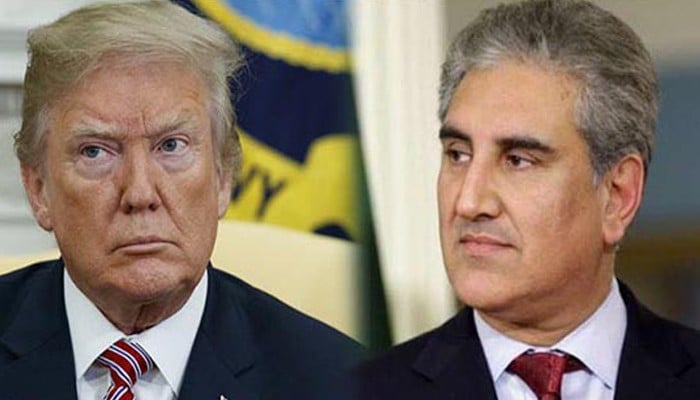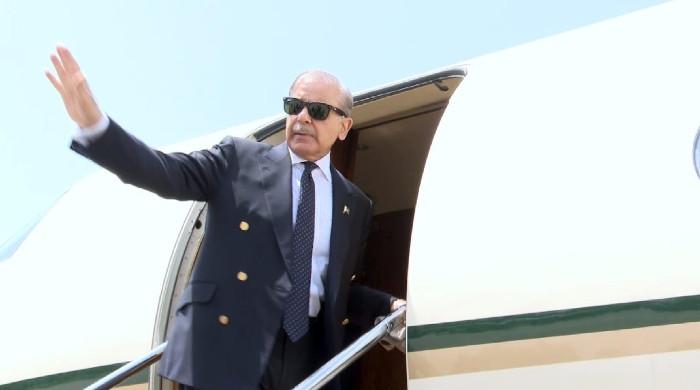US wishes to work with new Pak govt in realising reforms agenda, Pompeo tells Qureshi
The foreign minister will also meet US National Security Adviser John Bolton
October 03, 2018
WASHINGTON: Foreign Minister Shah Mehmood Qureshi on Tuesday night met with the United States' top civilian and military brass, including Secretary of State Mike Pompeo and National Security Advisor John Bolton, to discuss bilateral ties and regional situation.
In his 20-minute meeting with the secretary of state, the two discussed bilateral issues and matters pertaining to regional security.
According to a statement issued by a spokesperson for the Pakistani Foreign Office, Qureshi stressed to Pompeo that "peace in South Asia, which was a common goal of both the United States and Pakistan, would remain elusive until all disputes, including the core dispute of Jammu and Kashmir, are resolved".
The Pakistani foreign minister called on the US state secretary here at the Department of State office, in what became his third meeting with his American counterpart this month, after the latter invited him to visit Washington during his visit to Islamabad last month.
Close engagement between the two countries, he added, had always been mutually beneficial and a factor for stability in South Asia. "Going forward, a broad-based and structured framework for dialogue would best serve the two countries' shared interests," he said in the statement.
Pakistan maintained that it wants to work with the US to bring peace and prosperity in Afghanistan, he said, while the US President Donald Trump's administration seeks Islamabad's help in negotiating talks with the Taliban.
The foreign minister had categorically declared last week that he would be candid with his American counterpart.
"Disappointments come in when we make promises that we can not deliver on, so we have to be careful in what we commit to, and, when we commit to something, we should honour it," he said, adding that the US "had to understand the new evolution, and thought process in the country today as never before, this consensus in what direction we have to go.
The two leaders agreed on their nations' common desire for peace and stability in Afghanistan and the region at large, with Qureshi noting that the use of force had failed to deliver results. Pompeo, on the other hand, appreciated Islamabad's support for a political reconciliation in Kabul and its efforts for peace in the region.
Both sides agreed that the time was ripe for the Afghan Taliban to avail the chance at a political settlement by seizing the opportunity for dialogue.
Qureshi was accompanied by Foreign Secretary Tehmina Janjua and Ali Jahangir Siddiqui, the Pakistani Ambassador to the US.
Meeting with Bolton, Sen Booker
On the other hand, during his meeting with Bolton at the White House, Qureshi said Pakistan welcomed and supported the US' renewed efforts towards for a political resolution for the Afghan conflict. He reiterated Islamabad's long-held position that there was no military solution to the situation in Kabul, according to the FO statement.
The foreign minister stated that Pakistan would continue to support the efforts for an Afghan-owned and -led peace and reconciliation process in its westside neighbour. The country regarded peace and stability in Afghanistan as vital for its own long-term stability and progress, he underscored, as per the statement.
Referring to Islamabad's continued efforts to positively engage the national unity government in Afghanistan, Qureshi underlined that the Afghanistan-Pakistan Action Plan for Peace and Solidarity (APAPPS) offered the most effective mechanism to promote the mutually-beneficial cooperation between the two neighbouring states, the statement added.
The foreign minister also briefed his hosts, especially Washington's security advisor, about India's rising aggressive posturing in the South Asian region and underscored that Islamabad remained committed to engaging New Delhi in a comprehensive peace dialogue to resolve all outstanding issues, including the Kashmir dispute.
The two leaders agreed that a continued cooperation between Pakistan and the US was in the interest of regional peace and security in South Asia.
Qureshi, alongside Foreign Secretary Janjua and Ambassador Siddiqui, was also scheduled to meet some members of the US Congress. Prior to this, he met Democratic Senator Cory Booker of New Jersey, the first African-American one from the state, with whom, too, he discussed the situation in the South Asian region.
Booker, who has held the senatorship since 2013, said the change in Pakistan had brought a new hope for peace in the region. Islamabad's sacrifices in the war against terror should be recognised, he added.
'Reset' of Pak-US relations
The Pakistani and US foreign ministers had first held talks in Islamabad last month, following which Qureshi had said the disconnect between the two nations was addressed in the meeting and that both sides had agreed to "reset" their ties.
Qureshi had also said the next round of negotiations between the respective authorities would be held in Washington. "I will meet Secretary Pompeo during my visit to the United Nations General Assembly [UNGA]," he had noted.
The foreign minister, who arrived in Washington and travelled to New York for the UNGA, had led the Pakistani delegation in the General Assembly's 73rd session.
Last week, Qureshi had met US President Donald Trump when the latter received him at an unscheduled meeting. He had explained that the American head-of-state had requested him to "rebuild the cordial relations that we have enjoyed in the past".
The foreign minister had said he received a “positive response” from Trump who had reiterated that Washington also intends to “rebuild” relations.
—Editing by Haseem uz Zaman













